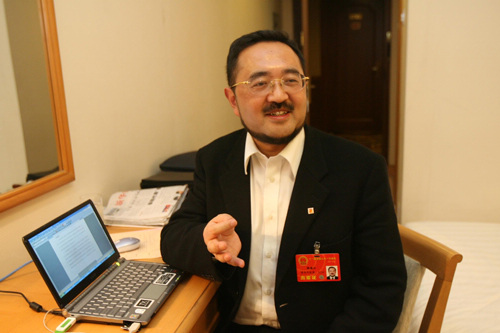|
 |
|
MY MOTION: Han Deyun, a deputy to the National People's Congress, China's top legislature, has attached to the same motion on legislation of officials' assets declaration for seven consecutive years (CFP) |
For the seventh consecutive year, Han Deyun, a deputy to the National People's Congress (NPC), China's top legislature, tabled a motion calling for legislation which mandates that officials declare their assets, at the annual full session of the NPC earlier this month.
"As I am engaged in legal service, I have encountered many corruption cases firsthand. What troubles me is that some seemingly honest and well-meaning officials eventually become criminals," said Han, a lawyer from southwest China's Chongqing Municipality.
Chinese civil servants have traditionally not disclosed their income and personal assets and this lack of transparency is seen to be a major factor in corruption that continues to plague government organizations. During this year's NPC session, the disclosure of officials' assets and income was once again in the media spotlight.
In 2006, Han brought up the motion for the first time and was impressed by the enthusiasm of the media and the public. "It is not only average people but also officials who support this system," Han said.
According to a survey by the Blue Book of Rule of Law issued by the Chinese Academy of Social Sciences (CASS) last year, 70 percent of public servants support Han's motion.
After years of being told that conditions were not mature for his proposed legislation, in August 2010 Han received a reply from the Central Commission for Discipline Inspection (CCDI) of the Communist Party of China (CPC), the Party's top discipline watchdog, saying that relevant authorities had begun drafting proposals for a system that would compel officials to declare their assets.
While Han is pleased by the positive feedback, he believes there is still a long way to go before effective legislation is actually introduced.
Corruption is a major public concern in China. Last year, a total of 2,524 officials above the county head-level, including seven former ministerial-level officials, were investigated for suspected embezzlement or bribery.
"To solve the problem, the most effective method would be a legal one," Han said. He insists that assets declaration by officials is one of the most effective ways to curb corruption.
Early in 1995, the CPC Central Committee and the State Council promulgated a regulation, requiring high-ranking officials to report their income.
In 2010 the CCDI issued a regulation that obliges leading officials to report personal income, the employment status of children and spouses as well as their property interests and investments. Leading officials are specified as those holding deputy-county level positions or above in Party organs, legislatures, governments and other public institutions.
However, while these income details are already available to the Party's discipline watchdogs and supervisory departments of governments at all levels, they are not disclosed to the public.
Meanwhile, in order to avoid punishment, some corrupt officials have transferred their illegal gains to spouses or children overseas. Some have exploited investment immigration policies to acquire foreign citizenship.
According to a report filed in 2008 by the Anti-Money Laundering Monitoring and Analysis Center of the People's Bank of China, some officials and top company executives tended to transfer assets through at least eight routes, including cash smuggling, underground financial institutions and offshore financial centers.
Only a complete assets declaration system can help prevent corrupt officials from fleeing the country and transferring embezzled funds and bribes abroad, said Xin Xiangyang, a research fellow with the CASS.
However, the CCDI hasn't given a timetable for implementing the much-anticipated assets declaration system for officials, citing technical reasons.
| 